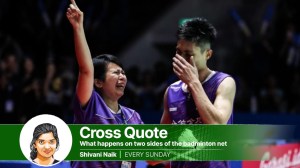Where is the class of ’70?
Ask Brazilians why they think their country will win their fifth World Cup tomorrow night and the usual answer is tradicao. There is no ment...

Ask Brazilians why they think their country will win their fifth World Cup tomorrow night and the usual answer is tradicao. There is no mention of Ronaldo’s speed, Denilson’s dribbling skills or Claudio Taffarel’s blessed hands. Just tradicao, meaning not just tradition but also destiny and even divine right.
The word gives an idea that, however well Brazil play, tomorrow’s team will always be in the shadow of the teams of previous years. In the Nineties Brazil may have had more success than in any other decade but no one would suggest the current crop are on a par with the great sides of 1958 and 1970.
Deciding on the best Brazil team of all time is a frequent topic of debate here. The World Cup runners-up of 1950 (who demolished Sweden 7-1 and Spain 6-1 before losing to Uruguay 2-1) are often cited. As are Zico’s and Socrates’s underachieving generation, still regarded as heroes for the beautiful way they played in 1982 despite losing 3-2 to Italy.
But the team who best symbolise Brazilian tradicaoare from 1970. They sealed their reputation as the best footballing country in the world, beating Italy 4-1 to become the first side to win the World Cup three times, and have given every subsequent team the impossible task of measuring up to them.
At least five of that Brazil team will be at the Stade de France tomorrow doing what famous footballers tend to do when they retire. Pele, Tostao, Gerson and Rivelino are commentating for different Brazilian television stations and Jairzinho is working for a Venezuelan broadcaster.
Apart from the coach Mario Zagallo, also the coach in 1970, the closest link to the current squad is Jairzinho, who is credited with finding Ronaldo when he was a teenager playing for Sao Cristovao, a second division Rio side.
Jairzinho, whose professional career ended in 1981, was the agent who sold the striker on to the Belo Horizonte club Cruzeiro for an estimated 16,000 Pounds.
Jairzinho, who in 1970 became – and remains – the only player to score in every round of a WorldCup, is the least accessible of the team. His professional life is based around football as a players’ agent, although last season he had a brief stint coaching the Greek first division side Kalamata.
Pele is still an omnipresent figure in Brazilian life. Known simply as `O Rei’ — The King — he recently stepped down as special minister for sport to take up his position as commentator for the Globo TV channel. He is the only player whose criticisms of the Brazil team can still make front-page headlines, notably last week when he said before the Holland semi-final that he thought the Dutch were the better team.
Pele is also the player who most cleverly used his position as a sports personality to make a fortune in business. His company, Pele Sports and Marketing, buys up TV rights for football games for broadcast in Latin America.
Carlos Alberto Torres, the full-back and captain who is perhaps best remembered for the superb fourth goal in the final, moved into management after he finished his career inthe United States. He now runs a football school in the nouveau riche Rio suburb of Barra de Tijuca.
Rivelino and Gerson are both pundits on the Sao Paulo TV station Bandeirantes. Rivelino also runs his own sports centre on the Piazza Rivelino in Sao Paulo, and Gerson is now sports secretary at the city hall in Niteroi, across the bay from Rio.
Felix, the goalkeeper, works in his son-in-law’s motor-repair business in Sao Paulo, and the big defender Brito works for a local authority.
The midfielder Clodoaldo, who played alongside Pele at Santos, is trying to rescue the fortunes of that club as their vice-president.
Tostao, the so-called thinking player, is the most heavyweight of the footballers-turned-analysts. At first he became a doctor, now he writes for the broadsheet newspapers Jornal do Brasil and Estado de Sao Paulo.
The most tragic story is that of the left-back Everaldo, who died in a car crash shortly after picking up his winner’s medal in the 1970 tournament.
Photos



- 01
- 02
- 03
- 04
- 05




























